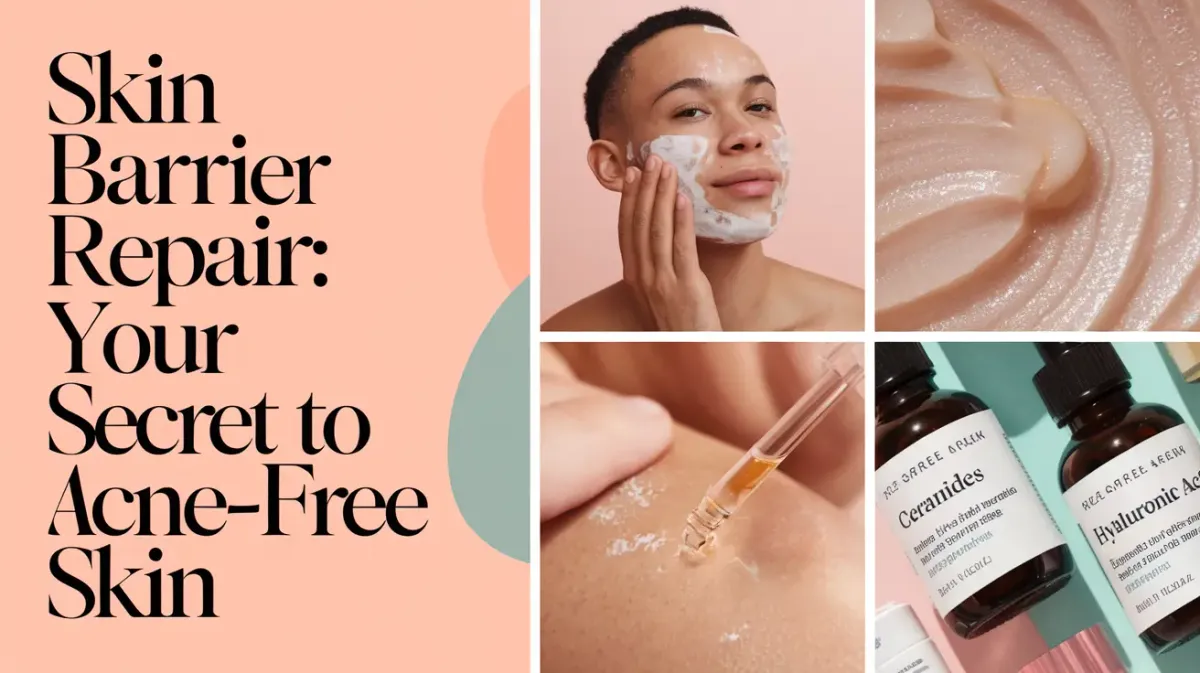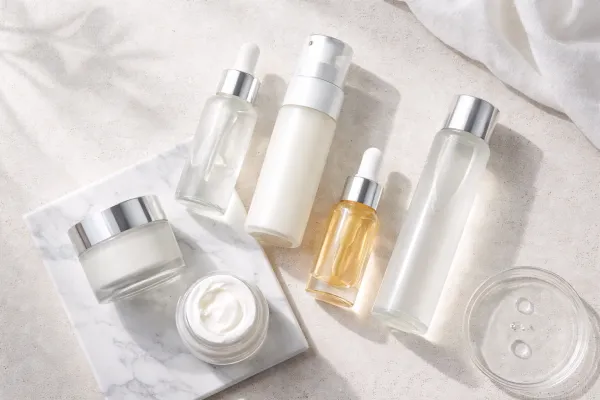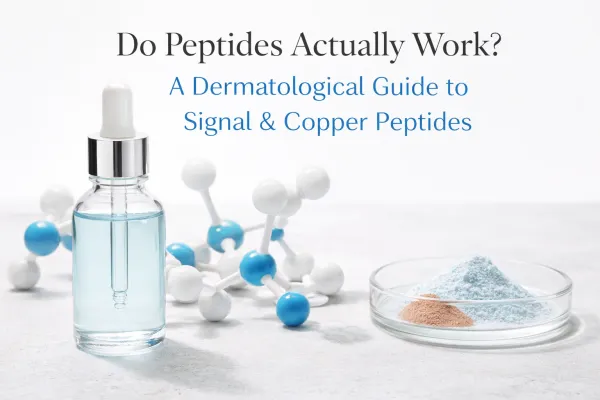Skin Barrier Repair for Acne-Prone Skin: Your Secret Weapon Against Breakouts
Discover how Skin Barrier Repair for Acne-Prone Skin can transform your complexion. Learn to heal, hydrate, and protect for clear, healthy skin.

Alright, let's get real about something that's been bugging a lot of us: acne. You've tried every potion and lotion, but those pesky pimples keep crashing the party.
What if I told you the secret to kicking acne to the curb isn't just about zapping zits, but about something called Skin Barrier Repair for Acne-Prone Skin?
Sounds fancy, but stick with me. Your skin's got this natural shield, like a bouncer at a club, keeping the good stuff in and the bad stuff out. When that bouncer's down, all sorts of trouble starts.
We're talking about dryness, redness, and yes, those dreaded breakouts. I've been there, done that, and after years of battling my own skin and helping others with theirs, I've cracked the code.
It's not about fighting your skin; it's about making peace with it. And that starts with understanding and fixing your skin barrier. Trust me, this is the game-changer you've been waiting for.
Key Takeaways: Skin Barrier Repair for Acne-Prone Skin
- Your skin barrier is like a shield. It keeps moisture in and bad stuff like bacteria and pollution out.
- When your skin barrier is damaged, it's easier for acne to show up.
- Things like too much sun, harsh soaps, and even some acne treatments can hurt your skin barrier.
- To fix your skin barrier, use gentle cleansers, moisturize a lot, and look for products with ceramides.
- A healthy skin barrier means less acne, less irritation, and better-looking skin overall.
- Ceramides are like the glue that holds your skin cells together, super important for a strong barrier.
Understanding the Skin Barrier: Your Skin's Bodyguard
Think of your skin barrier as the ultimate bodyguard for your face. It's the outermost layer of your skin, and its job is to keep the peace. When it's doing its job right, your skin is happy, hydrated, and clear. But when it's compromised, it's like leaving the door wide open for trouble.
I remember once, I went overboard with a new exfoliating scrub. My skin felt raw, and within days, I had a breakout like never before. That's when I learned the hard way that a healthy skin barrier is non-negotiable.
It's made up of skin cells held together by lipids, including cholesterol, fatty acids, and ceramides. These components work together to keep moisture locked in and irritants locked out. It's a delicate balance, and when it's off, your skin lets you know.
| Component | Function |
|---|---|
| Skin Cells | Provide structure and protection |
| Lipids (Ceramides, Cholesterol, Fatty Acids) | Maintain moisture and barrier integrity |
How a Damaged Skin Barrier Leads to Acne
So, what happens when your skin's bodyguard takes a hit?
It's simple: acne has a field day. A damaged skin barrier can't keep bacteria and irritants out, leading to inflammation and, you guessed it, pimples. It's like having a leaky roof during a storm – everything inside gets messed up.

I once had a client who couldn't understand why her acne kept getting worse despite using strong treatments. Turns out, those treatments were stripping her skin barrier, making her skin more vulnerable.
Once we focused on repairing her barrier, her skin started to heal, and the acne began to clear up. It's a classic case of treating the cause, not just the symptom. A weakened barrier also messes with your skin's oil production, leading to more breakouts. It's a vicious cycle, but one you can break.
- Damaged barrier lets in bacteria and irritants.
- Leads to inflammation and acne.
- Disrupts oil production, causing more breakouts.
Common Culprits Behind Skin Barrier Damage
Knowing what damages your skin barrier is half the battle. It's not just about avoiding these culprits but understanding how they affect your skin. Sun exposure, for example, is a big one.
UV rays can break down the lipids in your skin barrier, weakening it over time. Then there's over-exfoliating. We all love that squeaky-clean feeling, but too much of a good thing can strip your skin of its natural oils, leaving it defenseless. And let's not forget about harsh cleansers and some acne treatments.
They might promise clear skin, but they can also irritate and damage your barrier if you're not careful. It's all about finding that sweet spot – treating your skin without going overboard.
- Sun Exposure: Wear sunscreen daily.
- Over-Exfoliating: Limit to 1-2 times a week.
- Harsh Cleansers: Choose gentle, pH-balanced options.
- Acne Treatments: Use as directed, and don't overdo it.
Choosing the Right Cleanser for Skin Barrier Repair for Acne-Prone Skin
Picking the right cleanser is crucial. You want something that cleans your skin without stripping it. Look for cleansers that are soap-free and pH-balanced. These are gentle on your skin and help maintain its natural acidity, which is important for a healthy barrier.

I always tell people to think of their cleanser as the first step in treating their skin, not just cleaning it. It sets the stage for everything that comes after. And remember, more foam doesn't mean it's better. In fact, it can often mean the opposite.
A gentle, non-foaming cleanser can be just as effective without the harshness.
| Cleanser Type | Benefits |
|---|---|
| Soap-Free | Doesn't strip natural oils |
| pH-Balanced | Maintains skin's natural acidity |
| Non-Foaming | Gentle and effective cleaning |
Hydration: The Key to Restoring Your Skin Barrier
Hydration is your best friend when it comes to Skin Barrier Repair for Acne-Prone Skin. A well-hydrated skin barrier is a strong one. Think of it like watering a plant – without enough water, it wilts. Your skin is the same.
Using a hydrating serum with ingredients like hyaluronic acid can make a huge difference. It pulls moisture from the air into your skin, keeping it plump and healthy. Follow that up with a good moisturizer to lock in that hydration, and you're golden.
I've seen clients transform their skin just by getting serious about hydration. It's not just about drinking water, though that helps, it's about giving your skin the moisture it needs from the outside in.
- Hyaluronic Acid: Attracts and retains moisture.
- Moisturizer: Locks in hydration.
- Hydration and Skin Barrier Function: Essential for a strong barrier.
Ceramides: The Building Blocks of a Healthy Skin Barrier
Ceramides are like the cement that holds your skin cells together. They're essential for a healthy skin barrier, and if you're dealing with acne, chances are you could use more of them.
Studies have shown that people with acne often have lower levels of ceramides in their skin. This can lead to a weaker barrier and more inflammation.
Using products with ceramides can help restore your barrier and improve your skin's overall health. I always recommend looking for moisturizers and serums that list ceramides as a key ingredient. It's one of those things that might not be on your radar, but once you know about it, you'll see it everywhere.
And trust me, your skin will thank you for it.
For more on ceramides, check out this study on ceramide-containing skincare.
- Ceramides are crucial for skin barrier function.
- Acne-prone skin often lacks ceramides.
- Ceramide-rich products can help repair the skin barrier.
- Ceramides for Skin Barrier Health: A must-have in your skincare routine.
Specific Products for Skin Barrier Repair and Acne Treatment
When it comes to treating acne and repairing your skin barrier, not all products are created equal. You want to look for ones that address both issues without being too harsh.
For example, there are treatments out there that contain salicylic acid to fight acne, along with niacinamide and bakuchiol to soothe and repair the skin.
These ingredients work together to clear your skin while supporting your barrier. I've seen great results with products that take this dual approach. They tackle the acne without compromising the skin's natural defenses. It's all about finding that balance and using products that work with your skin, not against it.
- Salicylic Acid: Fights acne.
- Niacinamide: Soothes and repairs.
- Bakuchiol: Reduces discoloration and refines pores.
- Look for products that treat acne and support the skin barrier.
Expert Opinions: What Dermatologists Say About Skin Barrier Repair for Acne-Prone Skin
Dermatologists agree: a healthy skin barrier is crucial for managing acne. Dr. Mona Gohara, a leading dermatologist, emphasizes that the skin barrier is essential for overall skin health. When it's compromised, it can lead to a host of issues, including acne.
Experts recommend a gentle approach to skincare, focusing on products that repair and strengthen the barrier. This means avoiding harsh treatments that can strip the skin and opting for ones that support its natural function.
Clinical trials have shown that a skincare regimen focused on barrier repair can significantly improve acne. It's not just about treating the breakouts but creating a healthy environment for your skin to thrive.
"Your skin barrier is your first line of defense. Protecting it is crucial for preventing and treating acne," says Dr. Gohara. You can find more expert opinions on skin barrier health here.
- Dermatologists emphasize the importance of a healthy skin barrier.
- Gentle skincare routines are recommended.
- Barrier repair can significantly improve acne.
- Signs of a Damaged Skin Barrier: Learn to recognize them early.
The Benefits of a Healthy Skin Barrier Beyond Acne Control
Fixing your skin barrier does more than just help with acne. It's like upgrading your skin's operating system – everything runs smoother. A healthy barrier means your skin is better at keeping moisture in, which leads to a more hydrated, plump complexion.
It also means less sensitivity and irritation. Your skin becomes more resilient, less prone to redness and inflammation.
Plus, a strong barrier enhances the effectiveness of your other skincare products. It's like having a solid foundation – everything you build on top of it works better.
I've seen firsthand how focusing on barrier health can transform someone's skin, giving them a natural glow and confidence they never thought possible.
- Better moisture retention.
- Less sensitivity and irritation.
- Enhanced product effectiveness.
- Best Moisturizers for Skin Barrier Repair: Essential for maintaining hydration.
Conclusion
Alright, let's wrap this up. We've talked a lot about Skin Barrier Repair for Acne-Prone Skin, and if you take one thing away from this, let it be this: your skin barrier is your best friend in the fight against acne.
Treat it right, and it'll take care of you. It's not about quick fixes or harsh treatments. It's about understanding your skin and giving it what it needs to heal and thrive.
Use gentle cleansers, hydrate like your life depends on it, and look for those magical ceramides. Remember, it's a journey, not a sprint. Be patient, be consistent, and trust the process.
Your skin is a living, breathing organ, and it wants to be healthy just as much as you do. Help it get there, and you'll see the results. You've got this!
Further Resources
FAQ: Skin Barrier Repair for Acne-Prone Skin
Can a damaged skin barrier really cause acne?
You bet it can! Your skin barrier is like the bouncer at the door of your favorite club. When it's strong, it keeps the riff-raff out – bacteria, pollutants, and irritants. But when it's damaged, it's like the bouncer's taking a nap.
That bacteria (specifically Propionibacterium acnes or P. acnes) waltzes right in, throws a party in your pores, and next thing you know, you've got a breakout. A compromised skin barrier also leads to inflammation, which is a major player in acne formation. It is also a reason for skin sensitivity.
How do I know if my skin barrier is damaged?
Red flags, people, red flags! If your skin is constantly dry, tight, itchy, red, or inflamed, your barrier is screaming for help. Think of it like your skin is throwing a tantrum. You might also notice increased sensitivity to products, more frequent breakouts, and a general dullness. Your skin feels rough, and might even start to peel or flake. That is a sign of a compromised skin barrier.
What are ceramides, and why are they important for skin barrier repair?
Ceramides are like the mortar between your skin cells (the bricks). They're lipids (fats) that help hold everything together, creating a strong, healthy barrier. They prevent moisture loss and keep irritants out. If you're low on ceramides, your barrier weakens, leading to dryness, irritation, and yep, you guessed it – acne. Using ceramide-containing products helps to replenish the natural ceramide level.
What ingredients should I look for in skin barrier repair products?
Besides ceramides, look for hyaluronic acid (a moisture magnet), niacinamide (a form of vitamin B3 that soothes inflammation and strengthens the barrier), glycerin (another great humectant), and fatty acids (linoleic acid and linolenic acid). These ingredients are like a dream team for skin barrier repair. Also, look for cholesterol, which is also one of the natural lipids in your skin. Panthenol, also called provitamin B5 is also known to support the skin barrier.
How long does it take to repair a damaged skin barrier?
Patience, young grasshopper! It takes time, usually 4-6 weeks, but you might start seeing improvements sooner. It's like healing a wound – you need to give it consistent care. Stick to a gentle routine, avoid harsh skincare ingredients or exfoliants, and be patient. Consistency is key.
Can I still use acne treatments while repairing my skin barrier?
Yes, but tread lightly. Opt for gentle acne treatments like benzoyl peroxide or salicylic acid at lower concentrations. Avoid using too many actives at once. It's a balancing act – you want to treat the acne without further damaging your barrier. Maybe try the "skin cycling" method, where you alternate active ingredients.
Will repairing my skin barrier prevent all future breakouts?
While it won't make you immune to breakouts, a healthy skin barrier is your best defense against acne. It creates a less hospitable environment for acne-causing bacteria and reduces inflammation. Think of it as creating a strong foundation for clear skin. Skin barrier health is important for your overall skin health.
What's the best skincare routine for repairing my skin barrier?
Keep it simple, stupid! Cleanse with a gentle cleanser, use a hydrating toner (if you like), apply a serum with hyaluronic acid or niacinamide, follow up with a moisturizer containing ceramides, and always, always finish with sunscreen in the morning. Listen to your skin and adjust as needed.
Are there any lifestyle changes that can help repair my skin barrier?
You bet! Diet plays a role – think omega-3 fatty acids from fish and flaxseed. Stress management is crucial, as stress can worsen inflammation. Get enough sleep, drink plenty of water, and consider a humidifier if you live in a dry climate.
When should I see a dermatologist about my skin barrier and acne?
If you've tried everything and your acne is still raging, or if your skin is severely irritated, inflamed, or painful, it's time to call in the pros. A dermatologist can offer personalized advice, prescribe stronger acne treatments if needed, and help you create a plan to restore your skin barrier health. They might include topical retinoids.




